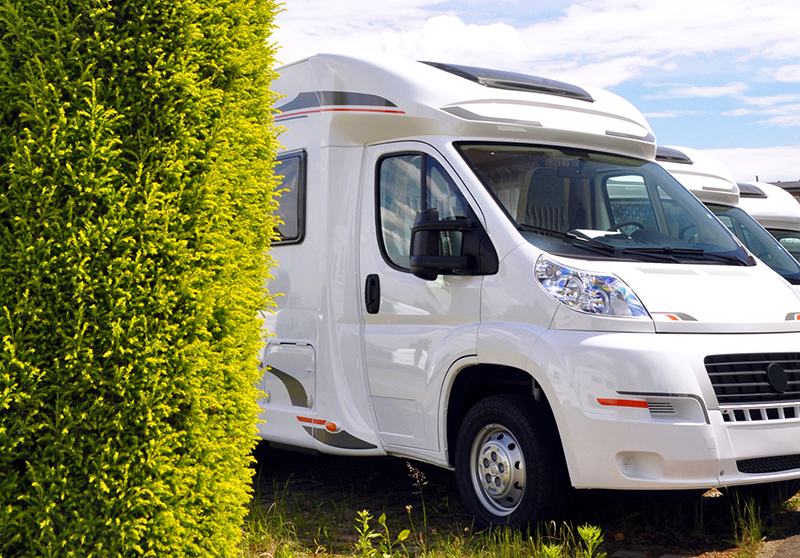Finding and buying a used motorhome can be a daunting task. Not only do buyers have to locate a rig that best meets their needs, but must also assess the vehicle’s condition and title. The condition relates to the general shape of the RV while the title deals with verifying clear title and free of any liens or encumbrances.

Newly produced motorhomes on a car park in a vehicle factory
Evaluating Prospective Purchases
So, you have found the RV that seems to be the best fit and is within budget. The condition assessment of the RV will involve the inspection of many items and components far too much to cover here and much of which are common sense. So we will deal with some that many buyers may overlook.
- Examine the windshield for any damage, including chips. Large windshields on motorhomes can be very expensive, and some insurance companies are now requiring a no-damage confirmation.
- Check the condition and manufacturing date of the tires. All tires have the build date embossed on the sidewall. Finding the tire maker’s date code can be easily researched through the manufacturer or the Internet.
- Visually check the inside of the wheels/tires for signs of oil leaking from the axles. Inside axle shaft seals are out of sight and easily missed.
- Move the vehicle enough to be able to observe its parked footprint. Look for any fluid stains within that area. Matching the stain locations with the underside of the unit will give you insight as to the cause.
- Check condition and smell of engine oil, transmission fluid and hydraulic oil (if applicable). A burnt fluid caused by overheating is usually evident. Take oil samples if you are at all uncomfortable with anything you see or feel. There are many automotive labs that can analyze these to determine any hidden issues.
Failure of some of these aforementioned items is not necessarily a “deal killer.” On the contrary, they can serve as a bargaining tool for a price reduction.
RV Paperwork
Checking the vehicle’s title and encumbrances is fairly simple and depend on the state or province. Your local department of motor vehicles can usually direct you to the appropriate authority. Should there be a loan currently on the vehicle, the full payment of the purchase should be made payable to the loan company.
Most of the above apply to purchases from a private seller. Buying from a private party often can save money, but there are shortfalls. Purchasing a used RV from a licensed dealer alleviates most of this, as they take care of the majority. Buying from a dealer can offer some advantages.
- The ability to take a trade-in not only makes it easier to upgrade, but it also usually reduces applicable sales taxes.
- Usually, a dealer-sold unit comes with at least a limited warranty.
- Dealer-arranged financing is generally quicker and easier than self sought
- Buying from a dealer may support a better relationship with the professionals that may be servicing your RV in the future.
- Either way, whichever buying route you go, the excitement of getting a new, or new-to-you, recreational vehicle can’t be beat!
Peter Mercer – See You Down The Road





